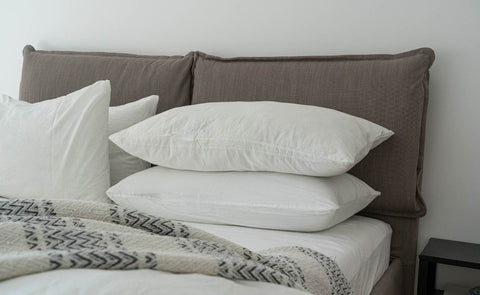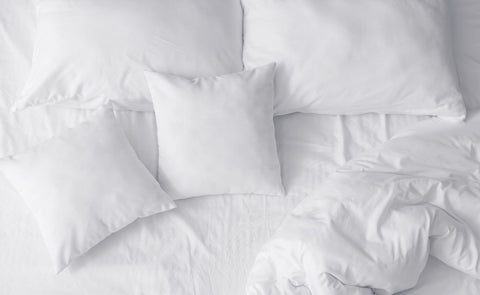Sleeping without a pillow is a practice that some people find beneficial for their sleep quality and overall health. This approach can potentially align the spine more naturally, especially for stomach sleepers, and might alleviate some forms of back and neck pain. However, the impact of forgoing a pillow varies depending on individual sleep habits and health conditions. It's important to understand how this change could affect your sleep and whether it aligns with your body’s needs.
Your sleep position plays a significant role in determining if sleeping without a pillow could be advantageous for you. Side and back sleepers may experience discomfort or pain without the support of a pillow, as it helps maintain the natural curvature of the spine. On the other hand, if you're a stomach sleeper, not using a pillow can help keep your spine more level. Moreover, other factors like the firmness of your mattress and your personal preference will influence your comfort and the quality of your sleep.
While contemplating the idea of sleeping without a pillow, consider not only the implications for your spinal alignment but also the possible effects on your skin health and hair. For some, removing the pillow can reduce the occurrence of wrinkles and mitigate hair breakage due to less friction. Nevertheless, it's essential to weigh these potential benefits against the risk of discomfort or the exacerbation of existing issues like glaucoma and acid reflux, for which elevation of the head during sleep is often recommended. Assessing your unique situation will guide you in making an informed decision about your sleep setup.
Benefits and Drawbacks of Sleeping Without a Pillow
When considering sleeping without a pillow, you are faced with potential benefits like improved spinal alignment, but also drawbacks that may affect sleep quality and overall health.
Improving Spinal Alignment
For some, especially back sleepers, removing the pillow can lead to a more natural position of the spine. Research suggests that neutral spine alignment, where the spine maintains its natural curve, is a goal for reducing strain on the neck joints and the spine. With no pillow, your head lies flat, which may promote this neutral position.
Effects on Sleep Quality and Comfort
Your comfort levels and quality of sleep can be contingent on how you position yourself during rest. While sleeping without a pillow may reduce neck and back pain for certain sleepers, it can lead to discomfort and difficulty falling into a deep sleep for others. The type of mattress you use also plays a crucial role in providing the correct support to maintain a comfortable position throughout the night.
Potential Health Impacts
Sleeping without a pillow could decrease stress on your neck and possibly benefit conditions such as obstructive sleep apnea or heartburn. That said, side and stomach sleepers might find their neck angled awkwardly, leading to morning stiffness. Always consult with a doctor if you have underlying health conditions that might be impacted by changes in your sleep posture.
Skin and Hair Considerations
Using a pillow, especially one with a silk pillowcase, can have protective effects on your skin and hair. Silk and satin reduce friction, therefore preventing wrinkles and acne, and causing less hair damage compared to standard cotton pillowcases. Sleeping without a pillow may increase the likelihood of your skin folding or bearing more pressure, potentially leading to increased wrinkles.
Risks and Considerations for Different Sleepers
The risks vary depending on your usual sleep posture. Side sleepers may experience increased neck and shoulder tension without a pillow to fill the gap between the shoulder and neck. Stomach sleepers might find their lower back pain exacerbated due to the tilt of the pelvis. Conversely, back sleepers may receive better support for maintaining a neutral spine alignment. Always listen to your body's signals and consider speaking with a healthcare professional before making significant changes to your sleep setup.
Optimizing Your Sleep Without a Pillow
Choosing to sleep without a pillow can be beneficial for some, but it's crucial to ensure your sleep environment is well-suited to this practice for the best results.
Choosing the Right Mattress
Your mattress plays a central role in maintaining good sleep posture. Look for a comfortable mattress that supports the natural curve of your spine. Mattress firmness is subjective, but typically, a medium-firm mattress can provide adequate support for most sleep positions.
Alternative Support Strategies
If you're foregoing a pillow, consider using a folded blanket or towel to provide minimal lift and maintain alignment. A thin pillow or low loft pillow can serve as a transitional object if eliminating a pillow entirely is too abrupt.
Sleep Position Adjustments
Adjust your sleep position to reduce stress on your neck and align your head, neck, and spine. Back sleepers might require a different setup than side or stomach sleepers to avoid an unnatural position or an awkward angle. Combination sleepers should pay extra attention to how their position affects their comfort throughout the night.
Addressing Specific Sleep Concerns
Sleep apnea, heartburn, acid reflux, and snoring can all be influenced by how you sleep. Sleeping without a pillow may help some conditions but worsen others. For example, elevating your head can be beneficial for acid reflux sufferers but may increase snoring in others.
Consulting Healthcare Professionals
Always consult a doctor or sleep health professional if you experience neck or back pain or other sleep disturbances. They can provide personalized recommendations based on your specific health conditions and ensure that your choice to sleep without a pillow won't impede blood flow or exacerbate existing issues.



